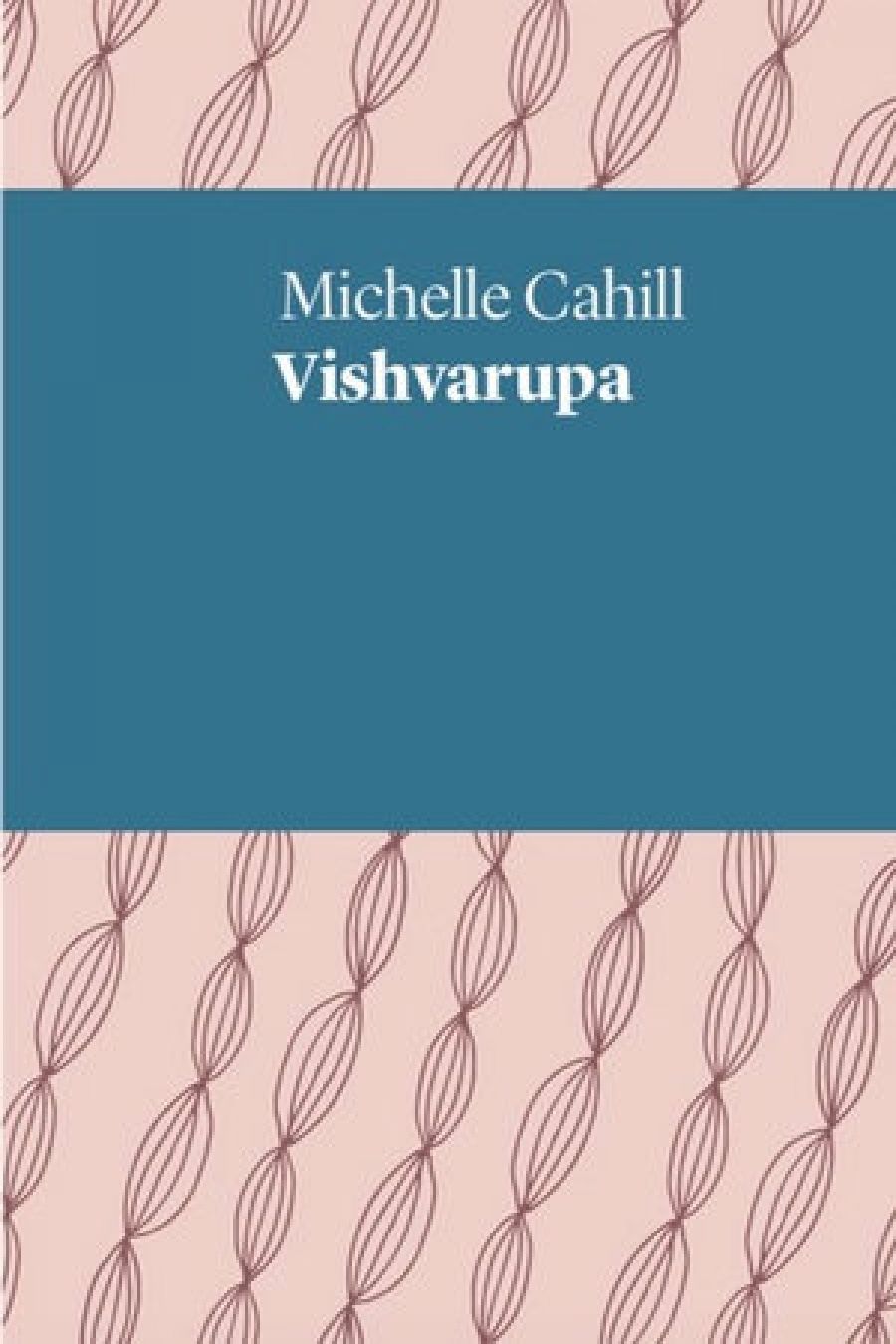
- Free Article: No
- Contents Category: Poetry
- Custom Article Title: Mark Treddinick reviews 'Vishvarūpa' by Michelle Cahill
- Review Article: Yes
- Online Only: No
- Custom Highlight Text:
Vishvarūpa, Michelle Cahill’s second collection, is a convocation of untouchables and deities – unbelieving, irreverent, and sardonic – each a proxy for an aspect of the poet’s (post-colonial) self; each a stand-in, even, for a moment in every human life.
- Book 1 Title: Vishvarūpa
- Book 1 Biblio: 5 Islands Press, $22.95 pb, 93 pp
- Book 1 Readings Link: https://www.booktopia.com.au/vishvarupa-michelle-cahill/book/9781760800352.html
‘Vishvarūpa’ means manifold, and alludes to an episode in the Bhagavad Gita when Krishna discloses the infinite and contradictory multiplicity of Himself, indeed of everything on Earth, to Arjuna. Many of the Hindu deities get a guernsey in Cahill’s smart and worldly collection. But none of these gods – nothing at all, in Vishvarūpa – is offered as itself alone, or as a simple metaphor; mimesis is, like identity, a complicated business, and Cahill handles it here with wit, craft, and courage.
All manner of castes and incarnations run through Vishvarūpa: Dalits, dhobis, ghosts, cities, creeks, Greek deities. Much more than a deft postmodern exegesis on Sanskrit texts or on language itself (a fraught, if sometimes beautiful, trading floor for identity and power), Vishvarūpa practises a tough kind of spiritual journalism. The book traverses a wide emotional and physical geography, singing, as it travels, half-embarrassed hymns to the world, ‘as if all singing has been censored’.
From Kuring-gai Chase to Dharamsala; from a child’s swing to a ghost ship; from transvestites in Mumbai to the antipodean grammar of a daughter’s crayon drawings; from Hamlet at the Opera House to Parvati in Darlinghurst and Ganesa, these poems do, with restrained, sometimes pained eloquence, what only poems can do: they make moments enormous; they speak for the voiceless; they arrest time; they recharge language; they turn the sensual world inside out; they complicate and clarify perception.
Cahill’s poems rise from that place where the personal self bleeds – often under the weight of grief or under the influence of love in its many forms – into the Self (as Krishna might put it); where the private escapes the ego’s grip and becomes the human.
‘Ode to Mumbai’ – perhaps the richest poem in the collection – instantiates this yearning best. Mumbai, in the poem, becomes the uncanny (unheimlich), indifferent Beloved, from the book of whose poems ‘my pages are missing’; and the poem is the poet’s triumph over ‘the unwieldy syntax’, the travesties, of silence, and the historical and personal erasures it encloses.
By forcing hard linguistic choices on a poet, poetic form frees language (forces it, even) to perform the more than merely functional work we need it to perform: recasting trauma, transfiguring pain, unseating banality, throwing soft bombs. And Cahill’s poems are rich with the kind of language that gets that work done: ‘In the temple of ears, you are daylight’s voice’; ‘the splatter of moss / sown like a seam through stone, a silent threnody’; ‘the khaki songs of cicadas’; ‘the grass / whose rumours are haptic’; ‘nature’s choked with similes’; ‘a small emergency of words’.
Cahill pulls off these feats of language across an array of poetic forms of varying lengths: tercets, quatrains, prose poems, and free verse. Her collection is visually, as well as linguistically and sonically, satisfying.
Many of the poems are philosophical pastiches, urban remixes of old stories. They are ironic, erotic, and erudite. ‘Two Souls’, ‘Kali From Abroad’, ‘Ganesa Resurrected’, ‘Durga: A Self-Portrait’, and ‘Laksmi Under Oath’ may be the strongest. But the eros and originality of the Hindu poems, including the frighteningly accomplished ‘Reading the Mahabharata’, may distract a reader from quieter, perhaps better, poems in Vishvarūpa, subdued and complex lyrics such as ‘The Chase’, ‘Enough’, ‘Joy’, ‘Alchemy of Leaves’, ‘Kissing Hamlet’, ‘Childhood’, ‘In My Father’s Absence’, ‘At West Head’, and ‘The Stinking Mantra’. Each of these poems – so resonant with the edgy melancholy, the unconvinced lyricism characteristic of this poet’s work – aches to unburden itself, but pulls back. These poems muffle their confessions. Now and then, plaintive hints like ‘all this to slake me, to dress my grief’ and ‘though I’ve stopped searching love’ feel evasive. But on the whole, Vishvarūpa betrays more vulnerability, more hard-won and deeply felt emotion, than does Cahill’s first collection, The Accidental Cage (2006). The poet writes herself in Vishvarūpa as neither victim nor hero, but as a wayward god, a beautiful stranger. She could be any one of us.
But perhaps, after all, this poet writes most truthfully when she tells it slant. ‘Cowan Creek’, a short nature poem, reveals more in its gorgeous speech music (‘oyster shells necklace the creek, its mangrove decay’) than any of the confessional poems. It closes with two self-reflexive lines that feel like a thesis argued by the place: ‘it’s so quiet you can hear the heart speak – / petulant, contradictory, famished.’
But you would misread the poems in Vishvarūpa if you missed their philosophy, their politico-poetic project (to free castes, pasts, mythologies, identities, and language itself from colonial and paternalistic oversimplifications); and if you didn’t hear in them the subcontinent, whose scents and rhythms sleepwalk Cahill’s thought and sclerophyll syntax.
These poems are diasporic and compassionate, open to the otherness and mystery inside the personal, the everyday, and the disdained, as well as to the more conventionally sacred. Vishvarūpa proclaims no theology, but a spiritual intelligence infuses it. There is no god here; no simple binaries. ‘There is nothing pure’, the poet writes. In Vishvarūpa, Michelle Cahill finds a singular voice for multiplicity, and she edges language out of silence and toward its own place in this world.


Comments powered by CComment